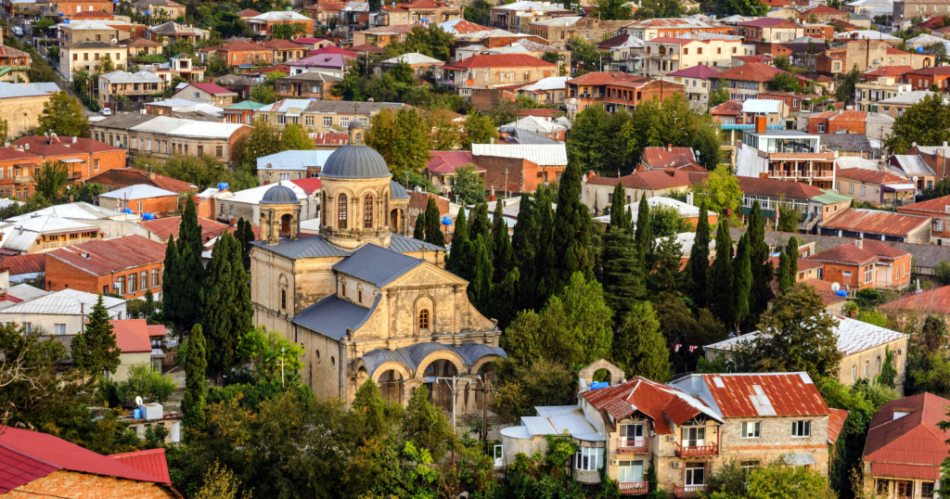Nestled between Europe and Asia, the Caucasus region (think Georgia, Armenia, and Azerbaijan) is emerging as an underrated haven for vegetarian travelers.
Known for its legendary hospitality and breathtaking mountain landscapes, this area is now drawing herbivorous adventurers with a surprisingly rich plant-based culture.
From age-old meatless recipes born of tradition to trendy new vegan bistros in bustling capitals, the Caucasus offers vegetarian voyagers the whole package: delicious food, affordability, sustainability, and a big helping of community spirit.
Below, we’ve plated up 7 lesser-known reasons why veg-heads are falling in love with this quirky, beautiful region – no kebabs required.
1. Centuries-Old Veggie Traditions (No Meat, No Problem!)
Surprise! The Caucasus has been dishing up vegetarian delights long before it was cool.
In Georgia, devout Orthodox Christian practices mean locals eat mostly plant-based food during fasting periods – adding up to 200 days a year of vegan-friendly feasting.
Rather than feeling like deprivation, these fasts have spawned a whole cuisine of hearty meat-free dishes packed with seasonal veggies, mushrooms, nuts, and herbs.
Classic Georgian appetizers like pkhali – vivid walnut-and-veggie pâtés studded with pomegranate seeds – and badrijani nigvzit – eggplant rolls slathered in garlicky walnut paste – are accidentally vegan superstars that have been beloved for generations.
Meanwhile, in Armenia, many staple foods are “vegan by default” thanks to similar traditions and local ingenuity. Take pasuts tolma (a.k.a. basooc dolma): grape or cabbage leaves stuffed with chickpeas, lentils, rice, and herbs, a satisfying vegan riff on dolma that you’ll find almost everywhere.
And one of Armenia’s most iconic dishes, jingalov hats, is literally a forager’s dream flatbread – stuffed with a mix of dozens of wild greens and herbs. It’s so adored that there are even festivals dedicated to jingalov hats in the country’s south (“Hats” means bread – and yes, this warm, chewy herb-stuffed bread is 100% vegan deliciousness!).
2. A Booming Plant-Based Restaurant Scene
If home-cooking in the Caucasus is veggie-friendly, the restaurant scene is positively blossoming for plant-based eaters.
Each capital has seen a wave of cool vegetarian and vegan eateries popping up, reflecting a youthful, progressive food culture. Tbilisi, Georgia, for example, now boasts plenty of vegan-friendly cafes and even its first fully vegan coffeehouse and bakery.
From the cozy Mama Terra Veggie Corner (a local favorite for budget-friendly vegan comfort food) to chic spots like Namu (serving gourmet raw cuisine) and zero-waste café Zero Effect, options span all budgets and vibes.
The city’s original vegan hangout, Kiwi Cafe, has become a hub for travelers and locals to chill over dairy-free lattes and mushroom khinkali dumplings.
In Yerevan, Armenia, a new generation of restaurateurs is redefining healthy dining. The city recently welcomed its first fully vegan restaurants, like the futuristically named Future Diner and the hip 2022 Place, opened by repatriates blending Armenian recipes with modern twists.
Even traditionally meat-heavy menus are getting veggie makeovers – at Yerevan’s Veg&Co, the chefs recreate all the comfort foods (sushi, burgers, hot dogs) in vegan form, proudly adding new innovations each.
Not to be outdone, Baku, Azerbaijan, is also hopping on the herbivore train. As this oil-rich metropolis modernizes, it’s embracing global food trends – including plant-based dining. Restaurants across Baku are increasingly catering to vegetarians and vegans, rolling out creative dishes that blend international flavors with Azerbaijani classics.
One cozy spot, Manipura Café, even serves a vegan version of the national plov (pilaf) alongside juicy meatless burgers, while Vida Café offers a menu that’s 90% vegetarian or vegan.
3. Food Festivals & Community Vibes Galore
Plant-based travelers love a good food fest, and the Caucasus is serving them up with flair. In fact, Tbilisi just held its first-ever large-scale vegan festival in 2023 – called Buneba Fest (meaning “Nature” fest) – a big two-day shindig in the park celebrating all things eco and animal-friendly.
Hundreds of locals and visitors turned up to sample vegan goodies, listen to music, and swap sustainable living tips.
The very existence of Buneba Fest says a lot about how far the veg community has come in Georgia – it’s enthusiastic, organized, and ready to party!
Likewise, November 1’s World Vegan Day has sparked special plant-based menus and events around Tbilisi in recent years, with restaurants crafting one-day vegan versions of traditional dishes to mark the occasion.
These events create a real sense of community and excitement around meat-free lifestyles, welcoming curious omnivores and hardcore vegans alike to join the fun.
Armenia, too, has seen veggie-minded gatherings.
Remember jingalov hats?
Whole festivals are devoted to this herb-stuffed flatbread, drawing crowds to Artsakh and Syunik to celebrate the humble weed-filled wonder.
In Tbilisi, pop-up vegan brunches and zero-waste farmer’s markets have become a thing, turning travel into an opportunity to mingle with like-minded locals. Simply put, there’s an infectious, upbeat energy around vegetarian food culture here – with festivals, workshops, and communal tables inviting you in.
Come for the food, stay for the friends!
4. Eco-Conscious Travel & Sustainable Eats
For many vegetarian travelers, caring about animals goes hand-in-hand with caring about the planet – and in the Caucasus, you’ll find that eco-conscious tourism is on the rise.
This region’s draw isn’t just its flavorful food; it’s the chance to experience a sustainable, back-to-nature lifestyle that makes your inner earth-lover sing.
Farm-to-table experiences abound: you can stay at family guesthouses where the veggies on your plate were picked that morning from the garden, or even volunteer at places like an eco-lodge in Georgia’s wine country that forages wild plants for its daily menu (Yes, you read that right – you might be invited to join a morning forage for wild mushrooms, berries, or edible greens, then learn to cook them in a traditional recipe!)
Permaculture farms, organic vineyards, and rural homestays give travelers a chance to connect with the land in a meaningful way. There’s nothing quite like enjoying a rustic tomato-and-herb stew by candlelight in the mountains, knowing your tourism directly supports local farmers and sustainable practices.
5. Affordable Adventures for the Hungry (Wallet-Friendly Feasts)
Traveling on a plant-based diet in the Caucasus isn’t just fulfilling for your soul – it’s amazingly kind to your budget. This region remains one of the best-value destinations in Eurasia, meaning you can feast like royalty on vegetarian goodies without flinching at the bill.
Local produce is abundant and cheap, and dining out won’t drain your funds the way it might in Western Europe.
For example, at one of Yerevan’s top vegan cafés, two people can enjoy a spread of vegan pizza, dumplings, hot dogs, and dessert for about $13 total(yes, really!).
In Tbilisi, you might splurge on a multi-course meal at an upscale vegetarian restaurant and find it’s a fraction of what you’d pay back home. Even street food and bakery snacks are steals: a piping hot bean-filled lobiani bread or a flaky spinach pastry costs mere coins but eats like a meal.
On the logistics side, the Caucasus is a backpacker’s dream for affordability.
Clean, comfortable guesthouses or hostel beds are inexpensive (and often include a hearty breakfast with veggie options like porridge, local cheese, and jam). Public transport – from city metro rides to cross-country minibuses – is dirt cheap, making it easy to hop between foodie hotspots.
You can sip on a glass of Georgia’s famous natural wine or Armenia’s pomegranate juice for a couple of dollars. And those ripe persimmons and figs calling your name at the bazaar?
You’ll feel like you’re practically robbing the vendor, given how cheap they are by the kilo.
6. Legendary Hospitality (No Meat Required)
The only thing warmer than a freshly baked Georgian bread is the hospitality of the Caucasus people. These cultures famously treat guests as “gifts from God,” and vegetarian visitors are no exception.
You’ll be welcomed and fed with an enthusiasm that transcends language barriers – and locals truly delight in seeing you enjoy their food, whether or not it includes meat.
In Georgia, you might be invited to a traditional supra, an hours-long feast where plates of food and rounds of toasts never cease. Worried how you’ll manage at a table laden with roasted meats?
Fear not: Supra customs dictate that there must be something for everyone, and vegetable dishes are always plentiful on the table.
You’ll scoop up eggplant rolls, tomato-cucumber salads, churchkhela snacks, pickled veggies, and bean stews to your heart’s content, while the toastmaster raises a glass to peace/friendship/(your home country)/and so on. Even the proudest carnivorous Georgian host will eagerly point out which dishes contain no meat so you can partake.
By the end of the night, you’ll be as stuffed as anyone, having experienced that magical Georgian concept of “shemomechama” – when you’re full but can’t stop eating because it’s just that good!
Armenians and Azerbaijanis, too, will go out of their way to accommodate guests. An Armenian grandparent might fry up extra potato patties and lavash bread when they learn you’re vegetarian, insisting you eat seconds (and thirds).
In rural villages, families are used to Lenten fasts and will proudly offer their best bean soups and wild herb salads to vegetarian visitors. There’s a genuine culture of caring through food here.
7. Off-the-Beaten-Path Cool Factor
Finally, there’s an undeniable thrill in exploring a destination that your friends haven’t already Instagrammed to death.
The Caucasus is just now appearing on travel radars – and for vegetarian globetrotters, that means you get to be a trendsetter.
This region offers that sweet spot of being ripe for discovery: it’s accessible and friendly for travelers yet still feels like a hidden gem with stories to tell.
As more intrepid foodies report back about the awesome veggie eats and scenery here, the buzz is building.
National Geographic even dubbed the ancient city of Kutaisi “a vegetarian traveler’s dream” in 2025, highlighting how locals forage for wild ingredients to create colorful meat-free feasts.
Posts about Georgian food markets, Armenian cooking classes, or hiking trips in the Caucasus mountains (complete with picnic spreads of local fruits and walnuts) are racking up likes on social media.
You might catch a TikTok of someone devouring vegan khinkali dumplings or an Instagram reel of a traveler at a Yerevan farmer’s market overwhelmed by the piles of fresh greens and herbs.
The world is starting to catch on that the Caucasus has this unique combination of epic nature, rich culture, and tasty vegetarian cuisine, making it a compelling alternative to the usual backpacker circuits.
Final thoughts
In conclusion, whether you’re in it for the delicious, diverse cuisine, the cultural immersion, the eco-friendly creds, or all of the above, the Caucasus region is a vegetarian traveler’s dream come true.
It’s got the homey flavors and hearty hospitality to satisfy your stomach, plus the adventure and authenticity to satisfy your soul.
So pack your bags (bring an appetite and maybe some stretchy pants), and get ready to say madloba, merci, and mnohokh – thank you – for the unforgettable veggie journey that awaits.
The Caucasus will feed you in every sense, and you’ll leave with new friends, fond memories, and perhaps a few secret recipes to spice up your kitchen back home. Bon voyage and happy feasting!









